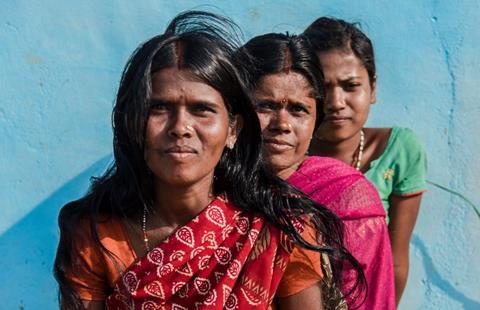Ruth Clemence explains why we should look outside our peer groups for friendships with other women

Friendships across the generations are to be treasured. I remember leaving for university with no family nearby and met Vera, an older lady who always looked out for me at church. Then there was Sylvia, who shared spiritual insights with me over a cup of tea in her home. Their kindness was comforting during a time of adjustment.
As a student, I appreciated the home-cooked meals and familiarity of a family atmosphere with the curate’s wife and young children. It was a welcome change to the small parameters of a student flat and stress of deadlines. Without realising it, I was learning what biblical parenting looked like as I spent time with them. This influenced my decisions with my own family years later.
I’ve come to see Christian women as being in a relay race together. We pass the baton of encouragement between one another, while continuing to run forward in faith. Our eyes are on Jesus as we spur one another on to the finish line. I’ve personally experienced the joy of having intergenerational friendships with older and younger women.
What we can offer one another
Older and younger women each have something to bring to enrich and encourage the other. Young women can set an example to the older women in “speech, in conduct, in love, in faith and in purity” (1 Timothy 4:12). Older women are to teach what is good (Titus 2:3-5), sharing wisdom and experience with patience, gentleness and kindness.
There are many benefits to having a friend of a different age. As a 2017 Age UK report on the importance of intergenerational connections concludes, contact across generations results in better attitudes towards older generations, less stereotyping and less anxiety toward ageing. Spending time with those of different ages gives empathy and understanding, reduces loneliness and grows confidence. With declining church attendance, ageing congregations, the loss of younger generations from churches and the impact of Covid-19, intergenerational friendships provide a vital opportunity for connection in these difficult times.
Having friends of different generations can provide alternative perspectives to our own. Older women have wisdom and insight from life experience. Younger women can offer a fresh view and understanding of the world. Both like to be heard and listened to. Both have something to offer, whether sharing life skills and tips, or being there for each other in times of joy and sadness. Louise (52) wrote letters to her friend Daphne (90) in lockdown to encourage her as she lived out her faith in a care home. Daphne unfortunately passed away but she was able to read Louise’s words right to the end of her life. Their friendship was established through prayer, mutual encouragement and love for Jesus.
Other women shared with me their experiences of intergenerational friendships and how they have benefited from those who have gone before them. Rachel (35) explains: “We have several wonderful women in our church who have adult children in their early 20s. I am really benefiting from their support of us with our little ones, and also hearing about surviving the teenage years. Not everything is perfect but it’s encouraging to hear about the relationships they have with their adult children.” Stacey (40) says: “I’ve loved getting cooking tips, watching how others parent, or how they relate to their spouse, sharing our struggles with life and faith, praying together.”
How intergenerational friendships can flourish
Friendship can be sparked through prayer, an invitation, volunteering, shared interests and mentoring. Praying to meet good friends was the start of Anna’s (36) friendship with Diane (57). Anna moved from England to Belfast before the first lockdown and met Diane who was volunteering at the parent and toddler group. Intentional communication was crucial in getting her through this time.
When I was a youth leader, one of the girls wanted to try out a fitness class that was running at the church, but she did not want to go alone. I volunteered to go with her. It was the start of our friendship and an opportunity to grow in faith together. My advice is seize every opportunity, be willing, laugh together – and let God work through your weaknesses.
It takes courage to start a conversation or invite someone to an activity or event. I took a risk and asked an older woman in my church to be my mentor. When we first met, we were an unlikely match. I was softly spoken and she was a no-nonsense, tell-it-like-it-is personality. I remember thinking: “I don’t want to get on the wrong side of her!” As I got to know her, I saw a woman who was zealous for Jesus, knew her Bible and would challenge me to grow in my faith. In turn, she valued my contribution to our deep discussions on life and faith, and we mutually championed one another to keep following God.
Reverend Jacqueline Peart, CEO of Jacqueline Peart International Ministries has lots of experience mentoring younger women. She comments: “One thing I have learned is how much young adults value, and even crave, ‘real’, transparent and open conversations. It’s not about me trying to be like them, but recognising I have something to offer.”
Jacqueline believes young adults have something to offer too: “Some of their knowledge, views and context on culture and life are illuminating.” intergenerational friendships that flourish are those where you can impact and be impacted in return. Jacqueline adds: “God can use anyone and anything, in any way at any time, so when both parties are open and teachable, it’s a beautiful thing.”
3 TIPS FOR BUILDING INTERGENERATIONAL FRIENDSHIP
1. Pray
Be specific and ask God for friends that cross the generations.
2. Be proactive
Volunteer, invite someone to your home or an activity, start a conversation, be brave!
3. Be focused
It may be helpful to talk about your hopes and expectations for the friendship. And make sure you keep Jesus at the centre of it.































